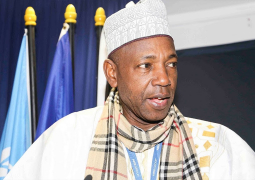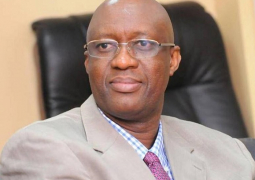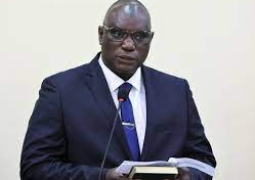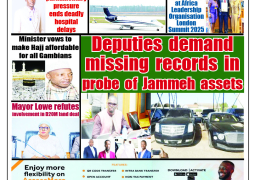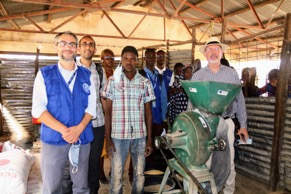
The villagers no longer have to trek kilometers to buy bread for family consumption.
Samba’s story is not an isolated one. He is among the over 360 youths who have received a reintegration support from the International Organisation (IOM) for Migration in The Gambia. Many of them have already settled down to begin rebuilding their lives in the country’s farthest region. The IOM have been implementing partners of the EU in the administration of thousands of Gambian returnees who voluntarily returned from Libya, Mali, Niger, among other destinations
“I will like to thank the European Union Ambassador for enabling my son to be returned to me, alive,” said Samba’s father, Muhamadou Jawo, around 70, seated under a mango tree with other village elders, including the village chief locally called Alkalo, next to the bakery. About half a dozen of the villagers gathered are men. Five other women leaders are also present.
The occasion is the visit of the EU Ambassador to The Gambia, Mr. Corrado Pampaloni. The diplomat is conducting a tour of EU funded projects in The Gambia, which brings him to the farthest end of The Gambia from his cozy Fajara offices in Banjul. His journey that morning started at 7am from Basse, where he spent the night with his team and IOM officials. Besides official project reports on his desk, he had to visit and personally see for himself how the close-to GMD 2 billion in funding is impacting the lives of returnees in The Gambia, among other non-migration projects.
“When our sons travel on the ‘backway’, we never have peace of mind. We keep wondering whether they will suffer or die on the journey. That thought gives us sleeplessness and headache each day until we see them again,” said a woman, who is among the management committee of this community project supported by the EU.
Before Samba travelled using the backway, he used to be a baker. But unsatisfied with life in rural Gambia, he abandoned this trade to venture on the journey. Now, with the involvement of the community in the project management, reintegration of Musa after his return became less hectic. Now he has trained and works with three other youths in the trade of bread baking.
Elsewhere in the same region, the EU Ambassador also visited Kundam village, about 420 kilometers from Banjul on Southern Upper River Region. Another community reintegration support project provided multipurpose milling machines for Musa, a youth in his thirties who now employs three others to provide cereal milling services for women.
Musa was among the returnees from Libya some years ago. When he arrived, an assessment was done by the IOM, based on community needs. It identified milling machine as a major challenge for women in this village.
“We used to travel up to 10 kilometers just to access milling machine for our cereals. Women begin as early as the call to dawn prayers, using pestle and mortar. It was such a burden on women here,” a woman representative said at the meeting with the Ambassador at Kundam.
According to official statistics, some 5,200 Gambians have been assisted by the UN migration agency since 2007. About 90 % of these opted for business as a new venture within their communities.
Ambassador Pampaloni, touched by these stories and the success of the reintegration support to these two communities was explicit in explaining that many migrants who risk their lives during the journey would never return.
“Some become assets or merchandise for the trafficking of human beings,” he told the community, adding that returnees are people who have values. Migration, he added, is possible but the best way to do migration is having the skills and being hired for the skill that somebody has.
“I understand that this project has helped in keeping your children at home. Migration is a very difficult business and very dangerous. What we want with this project with the IOM and other partners is to help the people to find a way to find work and live in the country where they were born and where they have all the family attachment,” the diplomat said.
Njoba Barry, a beneficiary of the bakery project who now works with Samba commended the EU through the IOM, saying that since the start of the project, he has now developed experience in baking bread. It means that there are up to four bakers from this community directly employed by the project.


